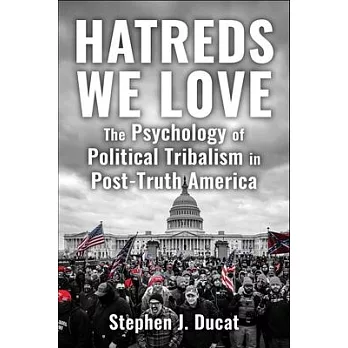An in-depth study of the malignant power of group identity in contemporary politics, most notable on the MAGA Right, that explains the growing longing for autocratic rule, the rise of delusional thinking, and the increasing comfort with political violence.
Fueled by conspiracy thinking and a growing indifference to facts, some Americans, especially on the Right, are increasingly seeing their fellow citizens as threats that must be eliminated. We are witnessing an epidemic of domestic terrorism with a rapidly accumulating body count. This may be the most serious challenge to the integrity of the United States since the Confederate insurrectionists launched their assault on Fort Sumpter in 1861. While an in-depth psychological reading of political events, Hatreds We Love: The Psychology of Political Tribalism in Post-Truth America is grounded in the scholarship and insights of social psychologists, anthropologists, historians, psychoanalysts, neuroscientists, and the many intrepid journalists increasingly threatened by authoritarians who have good reasons to fear truthful reporting. And, of course, author Stephen J. Ducat draws on his own experiences, visions, and values. A major topic addressed in the book is the malignant mindset animating MAGA neo-fascism’s zealous partisans. Donald Trump’s fortunes may fade in the coming months and years, but Trumpism will likely remain ascendant. Of course, xenophobic bigotry, violent aversion to democracy, political cults of personality, and indifference to facts are global phenomena and not limited to the United States. But America plays a prominent role, even abroad. In December 2022, it was revealed that a right-wing coup attempt in Germany was, to some extent, modeled on America’s own post-election insurrection, which was planned and executed by the paramilitary wing of the MAGA movement. That German episode was not the first time that the actions of American anti-democratic and white supremacist groups became the template for similar efforts worldwide. In the 1930s, German fascists looked to America as a blueprint for implementing race-based tribalism. Hitler so admired Jim Crow laws in the United States, especially concerning citizenship and anti-miscegenation laws, that he sent a team of legal scholars to study their statutory framework for addressing the problem of "racial pollution." While the Nazis initially found a lot to love and incorporate into the Nuremberg Laws, they ironically rejected much of the American model as too harsh. Many pundits have decried the "extremism" of Trumpian lynch-mob politics. On the contrary, Hatreds We Love argues that it is contiguous with the long history of American conservatism going back at least to the antebellum South. From this perspective, the worldview and actions of the GOP’s MAGA faction are the logical outcomes of the consistently expressed right-wing ethos of domination, xenophobia, and the "freedom" to harm. Although there is much handwringing about the toxic synergy of authoritarian political forces, white identity politics, and the embrace of post-factuality, there is insufficient understanding of the links between them. Chief among those links is tribal psychology. Nearly every political pundit decries political tribalism. Yet, public discussion rarely addresses more than its most disturbing symptoms. Hatreds We Love speaks to the causes and underlying dynamics of what is now one of the greatest threats to the viability of what remains of American democracy and global democratic governance more broadly. Zealous in-group loyalty is such a powerful driver of political behavior that people will readily abandon their values and long-held moral principles. They will even sacrifice their lives and those of their loved ones to avoid tribal exile--a fate more dreaded by some citizens than death itself. Historian Ruth Ben-Ghiat’s Strongmen has given us powerful insights into the common features of authoritarian leadership. Hatreds We Love complements her work by illuminating the psychology of followership. It will also offer readers ideas they can readily use to craft new, more effective forms of pro-democratic political action. Given recent developments, this analysis of partisan enmity could not be timelier.


 天天爆殺
天天爆殺  今日66折
今日66折 























 博客來
博客來 博客來
博客來 博客來
博客來 博客來
博客來 博客來
博客來